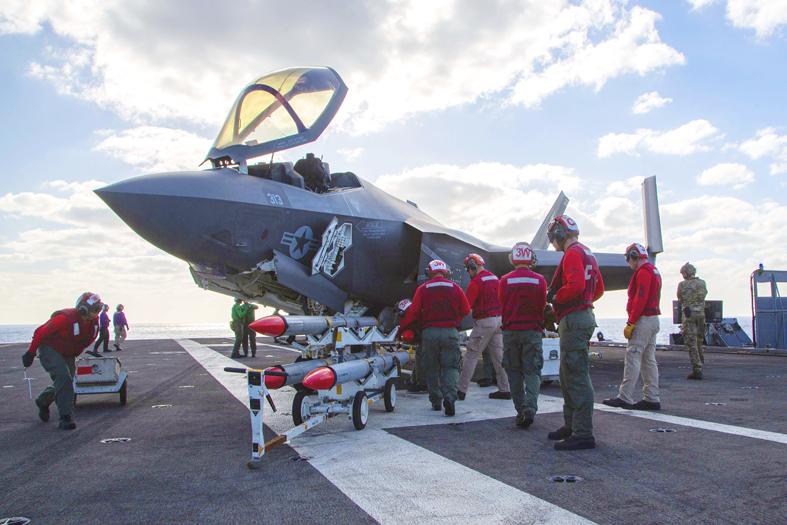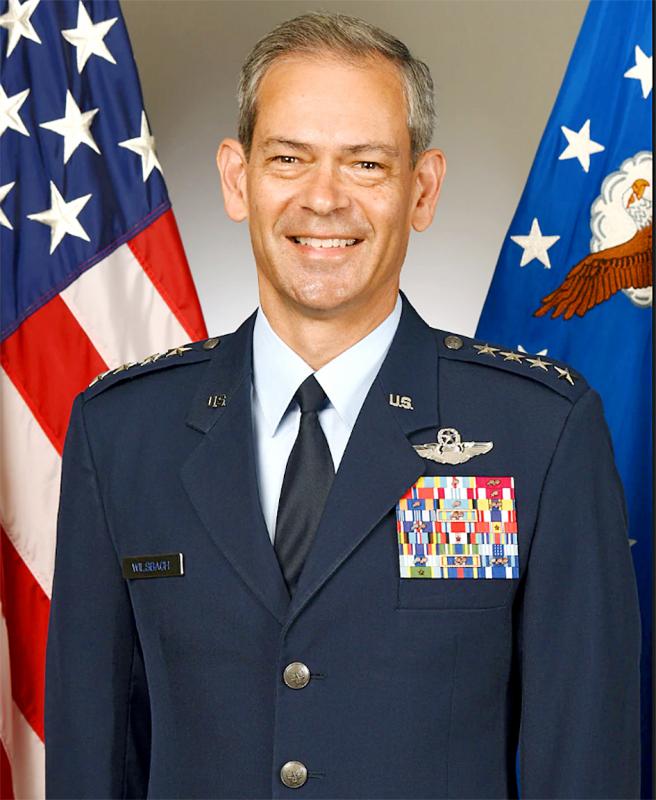An unprovoked attack on Taiwan by China would result in “more robust” consequences than those Russia is facing over its invasion of Ukraine, the commander of the US Pacific Air Forces said on Monday.
As Beijing watches the response to Russia’s invasion of Ukraine, it is hopefully learning the solidarity of the global community in opposing “an unprovoked attack on a neighbor,” General Kenneth Wilsbach said during a discussion streamed online by the US Air Force Association’s Mitchell Institute for Aerospace Studies and covered by Air Force Magazine.
China hopefully recognizes that if it moves similarly against Taiwan or another neighbor, “something more robust will happen,” Wilsbach said, adding that such an attack would “provide solidarity” for nations to come together in opposition.

Photo: AP
Wilsbach also chuckled at Beijing’s accusation that the US is trying to form a “NATO of the Pacific,” saying it is China’s own actions that are inspiring such talk.
If it does attack Taiwan, China would also have to contend with inhospitable terrain and regional opposition, he said.
As for the military relationship between China and Russia, Wilsbach said that although they cooperate, their forces are not interoperable.

Photo: screen grab from US Air Force website
“There’s been a couple of other exercises that we’ve seen them do together, but I would not say that they’re interoperable in any way,” he said. “Their systems are quite different.”
They also have a competitive power dynamic, with each side believing they should be the leader, he said, adding that he was “fairly happy with that tension.”
That is in contrast to the interoperability of US, Japanese, South Korean, Australian and other regional forces — an advantage that China recognizes, Wilsbach said.
“We fly with them routinely and we’re interoperable,” he said. “We’re flying a lot of the same equipment. We’re even data-linking together in some cases and the tactics are very similar.”
Joint activity between China and Russia has also declined, with Russia “pretty well occupied” in Ukraine, he added.
Saying that China is being “pretty cautious” to avoid getting caught up in the backlash against Russia, Wilsbach said “it still is very surprising that they’ve come up with the support rhetoric that they have.”
At the same time, the US Air Force has continued conducting daily exercises in the Indo-Pacific region, although now they are “fully integrated” with the US Navy and Marine Corps “to demonstrate what US forces can do in that part of the world,” he said.

OPTIMISTIC: The DGBAS sharply upgraded its GDP growth estimate from 3.54 percent to 7.71 percent after the Taiwan-US trade agreement signing and given AI optimism The US imported more from Taiwan than China for the first time in decades, as US President Donald Trump’s tariffs reshape trade flows while a global boom in artificial intelligence (AI) fuels demand for tech products. US purchases of goods from China plunged almost 44 percent in December last year from 2024 to US$21.1 billion, US Department of Commerce data showed on Thursday. By contrast, shipments from Taiwan more than doubled during the same period to US$24.7 billion. The soaring Taiwanese shipments to the US reflect the huge expansion in supplies of chips and servers for AI companies, which has completely changed

The Central Election Commission has amended election and recall regulations to require elected office candidates to provide proof that they have no Chinese citizenship, a Cabinet report said. The commission on Oct. 29 last year revised the Measures for the Permission of Family-based Residence, Long-term Residence and Settlement of People from the Mainland Area in the Taiwan Area (大陸地區人民在台灣地區依親居留長期居留或定居許可辦法), the Executive Yuan said in a report it submitted to the legislature for review. The revision requires Chinese citizens applying for permanent residency to submit notarial documents showing that they have lost their Chinese household record and have renounced — or have never

US and Chinese fighter jets briefly faced off above waters near the Korean Peninsula this week, Yonhap News agency reported, marking a rare confrontation in that area between the two superpowers. About 10 US fighter jets on Wednesday departed an airbase in Pyeongtaek, South Korea, for drills above international waters off South Korea’s western coast, the news outlet cited unidentified military sources as saying. While the US planes did not enter China’s air defense identification zone, Beijing scrambled planes as they neared that region, the report said. “The Chinese People’s Liberation Army organized naval and air forces to monitor and effectively respond

Taiwan has secured another breakthrough in fruit exports, with jujubes, dragon fruit and lychees approved for shipment to the EU, the Ministry of Agriculture said yesterday. The Animal and Plant Health Inspection Agency on Thursday received formal notification of the approval from the EU, the ministry said, adding that the decision was expected to expand Taiwanese fruit producers’ access to high-end European markets. Taiwan exported 126 tonnes of lychees last year, valued at US$1.48 million, with Japan accounting for 102 tonnes. Other export destinations included New Zealand, Hong Kong, the US and Australia, ministry data showed. Jujube exports totaled 103 tonnes, valued at